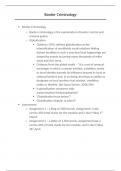Border Criminology
Border Criminology
o Border criminology is the examination of border control and
criminal justice
o Globalisation
Giddens (1991) defines globalisation as the
intensification of worldwide social relations linking
distant localities in such a way that local happenings are
shaped by events occurring many thousands of miles
away and vice versa.
Critiques from the global south – “it is a set of unequal
exchanges in which a certain artefact, condition, entity
or local identity extends its influence beyond its local or
national borders and, in so doing, develops an ability to
designate as local another rival artefact, condition,
entity or identity’ (de Sousa Santos, 2006:396)
Is globalisation synonyms with
westernisation/McDonaldisation?
‘Globalisation from below’?
Globalisation singular or plural?
Assessment
o Assignment 1 – a blog of 1000 words. Assignment 1 task
carries 40% total marks for the module and is due Friday 1 st
March
o Assignment 2 – a letter of 1,500 words. Assignment task 2
carries 60% of total marks for the module, and is due Friday
26th April
, Citizenship & Belonging:
CITIZENSHIP:
“Citizenship denotes the link between a person and the state. In
liberal democratic states. In liberal democratic states citizenship is
the main organizing principle that regulates a person’s access to
goods and services offered by the state, as well as the basis for
several important rights, such as the right to vote and right to
work” (Frank, 2020 pg 254)
The characteristics of citizenship (Gibney 2013)
o Rights and duties:
Involvement in democratic processes
Voting, campaigning, standing for office, holding
politicians to account
Respecting the law
Laws are a democratic process, we have the right
to be protected by them, but also to abide by
them
Right to work
The importance of citizenship (Gibney 2013)
o The unqualified right tot enter and remain in a country
o The qualities of a democratic, civil society, are only able to be
maintained if sufficient citizens do their duty and participate
in a democratic process
Staleness
o “A person who is not considered as a national by any state
under the operation of its law”
What does it take to become a citizen?
o Citizenship tests
o Financial tests
o English language tests
o Residency tests
What does it mean to belong?
o Institutional processes of naturalisation influence ‘identity’
and ‘belonging,’ they also influence social representations of
2
, ‘citizens’ and what it means to be British – Andreouli, Eleni,
and Caroline Howarth (2013)
Creating the ‘Other’
o “Who counts as ‘other’ is heavily dependent on national
experience, socio-economic status, cultural specificity, and
the particular conditions of membership and incorporation
that are shaped by varying democratic institutions and
practices” (Barker, 2013:241)
CITIZENSHIP & COUNTER-TERRORISM:
July 7 2005 – UK
September 11 2001 – US
Changes to citizenship after 2001
o The Nationality, Immigration and Asylum Act 2002
o The Immigration, Asylum and National Act 2006
o The Immigration Act 2014
o Counter Terrorism and Security Act (CTSA) 2015 and
Temporary Exclusion Orders (TEO)
Nationality and Borders Act 2022
o People seeking asylum can be sent to Rwanda
o Home Secretary can strip your citizenship without warning
o People seeking asylum can be criminalised
o People who arrive over the Channel can be treated more
harshly
Case study: Shamima Begum
o Left the UK to join ISIS at 15
o Married Dutch ISIS fighter
o Found in refugee camp with new-born baby, wants to come
home to UK
o Stripped of UK citizenship
READING:
Who counts as a migrant
3
, o There are many ways to interpret the term ‘migrant’
From a legal perspective, there is a key distinction
between ‘Persons Subject to Immigration Control,’ who
need permission to enter or to remain in the UK, and
those ‘Not Subject to Immigration Control’ who do not.
o Migrants in datasets
‘Migrant’ alternatively may be defined as ‘foreign
national’, for example in data obtained from National
Insurance Number (NINo) applications. This definition is
viewed as more problematic than country of birth, as a
person’s nationality can change.
In its analyses of migration into and out of Britain, the
Office for National Statistics (ONS) uses the UN
definition of ‘long-term international migrant’: “A
person who moves to a country other than that of his or
her usual residence for a period of at least a year […] so
that the country of destination effectively becomes his
or her new country of usual residence (UN 1998)”. The
main source of data on this is the International
Passenger Survey (IPS), which is in turn the basis for
ONS estimates of net migration
o What does it matter? Data and analysis
In Jan-Mar 2019, 17.8% of people employed in the UK
were foreign-born, while 11.3% were foreign nationals
(ONS, Employment, unemployment and economic
inactivity by nationality and country of birth, 14 May
2019)
o Definitions and public debate
The Migration Observatory’s public opinion survey
research and its 2018 briefing, UK Public Opinion
toward Immigration: Overall Attitudes and Level of
Concern, show that members of the public who want to
see immigration reduced are more likely to focus on
certain types of migrants – especially ‘illegal’
immigrants but also asylum seekers, extended family
4




